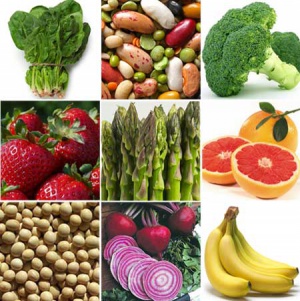Vitamin B9
Contents
Description
Also known as vitamin folic acid, folacin, folate, pteroyl-L-glutamic acid and pteroyl-L-glutamate, vitamin B9 is available in a variety of forms all of which are water-soluble. Part of the B vitamin family, vitamin B9 is vital to many bodily functions from synthesizing and repairing DNA to influencing and playing a role in the reaction of rapid cell division and growth. All humans at any age require vitamin B9 to create healthy blood cells and protect themselves against anemia. Vitamin B9 offers a variety of health and beauty benefits and is found in leafy vegetables, cereals, bread and may be taken as a supplement.
Health Benefits
There are many health benefits granted from the intake of vitamin B9, one of the most notable uses is in human reproduction as it is essential for pregnant women to make sure their intake of folic acid (vitamin B9 ) is at the proper levels. Other health benefits include the protection and prevention of heart disease, stroke, Renal disease, cancer, obesity, depression, memory, infectious disease, Parkinson’s disease, schizophrenia, allergic illnesses and conditions, bone health, Type I Diabetes, macular degeneration, tissue growth, menstrual pains and infertility.
Beauty Benefits
Some beauty benefits associated with vitamin B9 are normal bone, teeth, and hair growth which is essential to looking beautiful. Some even say that folic acid is the answer to hair loss and can prevent this condition if supplements are administered or food containing folic acid is eating regularly. Vitamin B9 is particularly beneficial to women, especially during pregnancy and in old age. In pregnancy, folic acid is important in prevent birth defects and promoting healthy growth of the child. In old age, folic acid is an important factor in preventing osteoporosis. Other benefits include strong nails, balance skin’s moisture levels, strong and thick hair, acne free and flake free skin, and the protection of skin cells from toxins such as free radicals.
Food sources
Vitamin B9 is readily available in a number of food including:
- Spinach
- Asparagus
- Turnip Greens
- Legumes: Peas, Lentils & Beans
- Baking Yeast
- Raspberry
- Banana
- Grapefruit
- Strawberries
- Beets
- Tomato
- Broccoli
- Bok Choy
- Pineapple
- Honeydew
- Soybeans
- Turkey
Daily Dose Recommendations
Depending on your native country or current country of residence, the various food sources and daily dose recommendations will vary as the subject of quantitative amounts needed for each person is a subject of great debate. Supplementation for infants and children is not recommendation commonly; most of their sources of this vitamin may be obtained by consuming various food sources. The following daily dose recommendations are for the USA:
Adults 19+ Years 400 Mcg/Day, Pregnant Women 600 Mcg/Day, Nursing Women 500 Mcg/Day
Deficiency
Vitamin B9 deficiency causes macrocytic anemia and raised levels of homocysteine. If this deficiency occurs during pregnancy, it may cause birth defects therefore supplementation or ingestion of foods high in folic acid should be consumed during pregnancy to prevent this. Most deficiencies occur within alcoholics, pregnant women and the elderly. Although rare, deficiencies also occur among people with absorption complications.
Side Effects & Toxicity
Most B vitamins are disposed out of the body through the urine on a regular basis, but taking large doses of certain B vitamins can product harmful side effects. In the case of vitamin B9, a deficiency in vitamin B12 is masked during toxicity of vitamin B9 which may lead to permanent damage neurologically.
